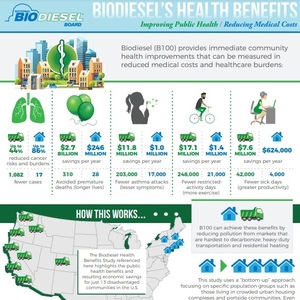Researchers find biodiesel saves lives, results in cost savings

April 29, 2021
BY National Biodiesel Board
A new study from Trinity Consultants demonstrates that switching to biodiesel results in a multitude of benefits at the neighborhood level, including significant health benefits such as decreased cancer risk, fewer premature deaths and reduced asthma attacks.
The study, sponsored by the National Biodiesel Board with support from the Nebraska Soybean Board, South Dakota Soybean Research & Promotion Council, California Advanced Biofuels Alliance, Iowa Soybean Board and the Wisconsin Soybean Marketing Board, used well established EPA air dispersion modeling tools coupled with health risk assessments and benefit valuations to assess the public health benefits and resulting economic savings of converting from petroleum-based diesel to 100 percent biodiesel, known as B100, in 13 sites and communities in the U.S. exposed to high rates of petroleum diesel pollution. Biodiesel is a readily available, low-carbon, renewable fuel made from a diverse mix of resources such as recycled cooking oil, soybean oil and animal fats.
"We have always known that biodiesel offers a better and cleaner alternative to petroleum diesel," National Biodiesel Board CEO Donnell Rehagen said. "This study quantifies the health benefits and shows that by using renewable fuels like biodiesel and renewable diesel, we are bringing positive change to people's lives, the nation's health and the economy."
Researchers found that switching to 100 percent biodiesel for home heating oil and transportation would annually bring the 13 communities studied:
•340 fewer premature deaths.
Advertisement
Advertisement
•46,000 fewer lost workdays.
•$3 billion in avoided health care costs.
In the transportation sector, benefits included a potential 45 percent reduction in cancer risk when heavy-duty trucks such as semis use B100 and 203,000 fewer or lessened asthma attacks.
When Bioheat® fuel made from 100 percent biodiesel is used in place of petroleum heating oil, the study found an 86 percent reduced cancer risk and 17,000 fewer lung problems.
The study also considered the economic cost of premature deaths, asthma cases, reduced activity due to poor health, and work impacted due to sick days. For example, researchers found the communities surrounding the Port of Los Angeles/Long Beach would avoid about $1.69 billion in health costs due to improved air quality in the form of reduced premature deaths and health care costs and increased productivity.
Advertisement
Advertisement
As these numbers represent findings from just 13 sites and communities, they are truly the tip of the iceberg. Rehagen noted that B100 can achieve these benefits by reducing pollution from markets that are hardest to decarbonize: heavy-duty transportation and residential heating.
“Saving lives by reducing the health impacts of transportation and home heating fuels is a priority, and biodiesel is widely available today to achieve that goal,” he said. “These immediate and substantial emissions and health benefits can and should be an important part in any state, regional or national climate program as our nation moves toward decarbonization through advanced alternative fuels like biodiesel and renewable diesel. The immediacy of these potential health benefits, especially for disadvantaged communities, is even more critical when one considers the years it will take for states to pursue deep electrification and other decarbonization strategies.”
The study was conducted by Trinity Consultants, which has over 40 years of experience conducting air dispersion modeling and related health risk assessments, among its many areas of expertise. Trinity operates 69 offices internationally and has performed air dispersion modeling for industrial facilities, utilities and government agencies.
Made from an increasingly diverse mix of resources such as recycled cooking oil, soybean oil and animal fats, biodiesel and renewable diesel are better, cleaner fuels that are available now for use in existing diesel engines without modification. NBB is the U.S. trade association representing the entire biodiesel and renewable diesel value chain, including producers, feedstock suppliers, and fuel distributors.
Related Stories
CoBank’s latest quarterly research report, released July 10, highlights current uncertainty around the implementation of three biofuel policies, RFS RVOs, small refinery exemptions (SREs) and the 45Z clean fuels production tax credit.
The U.S. Energy Information Administration maintained its forecast for 2025 and 2026 biodiesel, renewable diesel and sustainable aviation fuel (SAF) production in its latest Short-Term Energy Outlook, released July 8.
XCF Global Inc. on July 10 shared its strategic plan to invest close to $1 billion in developing a network of SAF production facilities, expanding its U.S. footprint, and advancing its international growth strategy.
U.S. fuel ethanol capacity fell slightly in April, while biodiesel and renewable diesel capacity held steady, according to data released by the U.S. EIA on June 30. Feedstock consumption was down when compared to the previous month.
XCF Global Inc. on July 8 provided a production update on its flagship New Rise Reno facility, underscoring that the plant has successfully produced SAF, renewable diesel, and renewable naphtha during its initial ramp-up.
Upcoming Events










